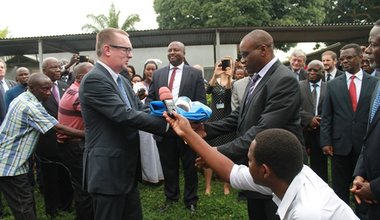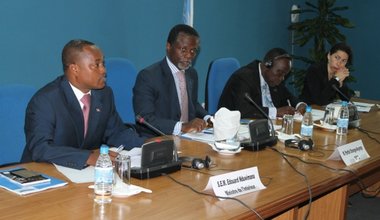A dozen killed in cholera outbreak
BUJUMBURA, 14 September 2011 - Burundian health officials are battling to control a cholera outbreak that has killed 12 people and infected 600 others since August.
Although the epidemic is under control in some areas, health officials in the capital, Bujumbura, said a new area of infection had started at Nyanza Lac, Makamba province, where 80 new cases have been reported, 64 of whom are in hospital.
"The figure is still high at Nyanza Lac because the infection is still new there and contingency measures are not yet in place as in other affected areas," said Pamphile Bukuru, an officer in charge of information, education and communication for behaviour change in the Ministry of Public Health.
The epidemic was reported on 5 August in the southern town of Rumonge in Bururi province, a cholera-prone area where residents often use unsafe water from Lake Tanganyika. The disease then spread rapidly to other localities, including the capital, Bujumbura, and provinces of Bujumbura Rural, Bubanza, Cibitoke and Makamba.
The Health Ministry declared the outbreak an epidemic on 18 August and mobilized its partners to put in place measures to control the disease.
According to Bukuru, several treatment centres were set up in the affected areas with emergency kits, comprising disinfection equipment, tents and rehydration kits.
Vénérand Nzigamasabo, head of the department of disaster management and assistance to vulnerable people at the Burundi Red Cross, said besides disinfecting the areas of origin of infections to cut the contamination chain, the agency was also supplying water for drinking and household use.
Nzigamasabo said 60,000 litres of water were being distributed daily in the affected areas of Bujumbura Rural and Bujumbura. He added that water bladders were being made available in Nyanza Lac.
The country's water and electricity utility, Regideso, has started water rationing in Bujumbura suburbs to ensure that areas in the outskirts of the city, especially those affected by the cholera outbreak, receive water. Due to an energy crisis in Bujumbura, the utility cannot supply water to all suburbs of the capital at the same time.
Efforts to contain the outbreak continue, with the Red Cross announcing it would distribute more hygiene kits - comprising jerry cans, soap and buckets - next week.
"The treatment of water at home is also envisaged since water-trucking is very expensive," Nzigamasabo said.
Cholera frequently breaks out in the south of the country as well as in the capital's suburbs due to the lack of safe drinking water and latrines.
Hygiene sensitization is, therefore, a crucial component of the strategy to control the disease outbreak. "It's all a matter of behaviour change; if the water is treated and if all partners sensitized the population in the use of latrines, there would be no problem," Bukuru said.
 UN
UN





